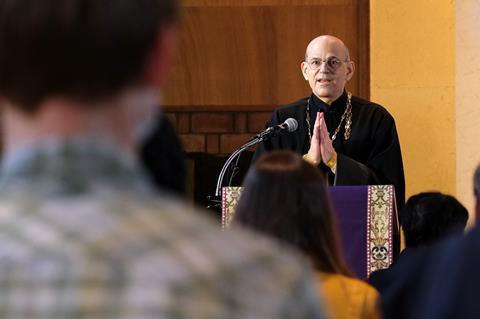Is it really possible for churches to reach a consensus on big decisions? Yes, says Peter Wilkinson. Writing from personal experience, Peter explains how every Christian can help discern the will of God for their congregation

What does decision-making look like in your church?
In some, leadership proposes oven-ready solutions for the rest of the congregation to accept, willingly or grudgingly. In others, a vote is used to discover what most people would prefer. In others, some blend of the two prevails.
I believe the locus of decision-making responsibility should not sit only with the pastor and/or the leaders. When it comes to making decisions sin a church, the biblical picture is one where authority sometimes resides with the congregation (Acts 6:3); sometimes with the elders (Hebrews 13:7); sometimes with a perceptive individual (Paul against Peter, Galatians 2:11); sometimes with a prophet (Acts 11:28); sometimes with the immediacy of God’s word to a gathering (Acts 13:1-3); and sometimes with the considered mind of leaders and people in harmony with the mind of the spirit (Acts 15:28).
Whatever denomination you are a part of, the Lord is the head of the Church. As the head, he will always have the wisest opinion on what we should do. Surely, therefore, we should eschew purely human approaches to decision-making and set our joint sights on determining his will for our congregations together.
But how?
Reaching agreement by collectively hearing God may sound difficult, if not impossible. And it may be one reason why some churches don’t involve their members at all in any decisions! But we have experienced a season in our church when, to widespread surprise and delight, clear and peaceful consensus became the norm in meetings of over 100 members.
Usually, after a range of opinions and views had been expressed without any obvious meeting of minds, a crucial contribution – or perhaps two, where the second speaker reinforced and complemented the first – suddenly changed the atmosphere and a way forward began to emerge with which most people could agree.
Did we create this ourselves? By no means. Was it the adamant will of one or two dominant individuals to which we gave in and reluctantly acquiesced? Certainly not.
What, then, was going on?
Our preparation had been ongoing for some time; the pastor and elders praying for the church, as a body, to be able to discern God’s purposes; the pastor preaching about God being a communicator who gives us his Holy Spirit, to allow us to see with spiritual eyes and hear with spiritual ears. And gradually a critical mass of individuals, who had learned by trial and error to recognise when God was speaking and when he wasn’t, came together and discovered that what they were experiencing individually could be experienced together (I have also written here on how couples can discern God’s will in their marriage).
Just as good seed sown in fertile ground produces an abundant crop (Matthew 13), it is possible to prepare the conditions in which God is much more likely to work when we ask him. Cultivating the conditions in which he is free both to speak and to act allowed us to approach him with confidence and expectation that he would do so and opened the way to learning to recognise his voice collectively and to understand in our hearts what it meant.
Consecration, thanksgiving and worship
In the Old Testament there’s an instructive story involving Joshua and the children of Israel (Joshua 5). They have just crossed the Jordan and the first obstacle facing them is the city of Jericho. Before the Lord revealed to them the unusual strategy to be employed to take the city, they had some preparation to undertake. Firstly, all the men born in the desert had to submit to circumcision as an act of consecration before the Lord, indicating that they were set apart for him. Next, they celebrated Passover giving thanks for their miraculous release from captivity. Finally, Joshua had to prostrate himself and take off his shoes in reverence before the commander of the Lord’s army, at which point the Lord speaks to him and tells him how to proceed. In like manner, consecration, thanksgiving and worship are useful means by which we prepare our hearts together in order to meet with the Lord and hear his voice.
We start with an understanding that all believers can hear from the Lord and an expectation that he can and will speak through anyone, even the youngest and least experienced (Psalm 119:105; Hebrews 1:1,2; John 16:13). Jesus said that the sheep hear and recognise his voice and that it is the only voice they will follow (John 10:3-5). This precept needs to be taught and practiced within our churches until it becomes the norm.
In addition, the Lord responds readily to a hunger for his presence when, in an atmosphere of worship, we actively seek, welcome and receive him in our midst. When we honour him in this way, he delights in revealing his presence and speaking to his children. As the Holy Spirit moves among us, he will bring understanding of his word and revelation of the way he wants us to go.
Finding consensus
For godly consensus to be achieved, it is necessary for God to have spoken to at least some of those involved in the decision-making process. So, all those involved should have been actively praying for God’s direction, searching and waiting for his word and alert to the many different biblical ways he has he of attracting our attention. He might give us a quiet inward sense, where we just know that we know; an insight from reading scripture or hearing a sermon or talk; timely advice from a friend or colleague; unusual circumstances that seem to indicate something; a dream or image or vision, plus many other strange, wonderful, and imaginative ways.
God has also blessed every one of us with sensing and feeling faculties for discerning what he is saying: the conscience; the human heart; the human spirit; and the work of the Holy Spirit, each of which is distinct and has a different function in the decision-making process. Expertise in discernment is not gained overnight or by attending a few church meetings. Rather, as Hebrews 5.14 suggests: “The mature are those who have their powers of discernment trained by constant practice.” Hence, both clergy and laity need to recognise the importance of their sensing and feeling faculties alongside their analytical skills.
The decision-making process itself should make room for all the components: analysis of the options; the perception of right and wrong from our consciences; the deep inward desires and convictions of our hearts; any sense of invisible spiritual dynamics registered as ease or unease in our human spirits; and any words of guidance and direction from the Holy Spirit. When all these components are laid bare, the participants must learn how to weigh their respective significance.
It is important to recognise that we have not all had the same experiences in life and that God will not necessarily speak to us all in the same way. In Exodus the Lord says something interesting to Moses: “I am the Lord. I appeared to Abraham, to Isaac and to Jacob as God Almighty, but by my name the Lord, I did not make myself known to them.” (Exodus 6:1-3). While the patriarchs may have been aware of the name Yahweh, they could not fully understand its significance as “the one who would redeem his people” this could only be fully comprehended by those who had experienced the Exodus. So, the Lord reveals himself to different people in different ways, in part due to the different experiences we have had.
A far richer tapestry
Different contributions from within the group can weave a tapestry far richer and more insightful than one input alone. This may mean that the emerging picture and developing consensus won’t align perfectly with what I believe God is saying to me, but it is possible in these circumstances still to recognise the Lord’s fingerprint on what we are discerning together. The hallmark of God at work in our midst may have more to do with the process we’ve committed to, than to the actual outcome. When a way forward seems to materialise miraculously out of confusion and against the odds, like a Polaroid photograph, one can conclude that only God could have done that.
The choice of chair for these meetings is key. While it’s usual for the pastor or vicar to take charge of the gathering, we suggest that they’re not necessarily the best choice. They may have the greatest vested interest in achieving a particular outcome and any proposals/motions brought to the table are likely to have come from a leadership team/eldership/diaconate also chaired by the pastor.
Some time ago the pastor of our church realised that if he chaired the members’ meeting, people might feel less free to share their beliefs and concerns about what God may be saying and wanting. So, he stepped down and we appointed a well-regarded and approachable elder to take the chair. He was skilled in teasing out what the people were sensing and feeling and in recognising when agreement on the way forward was emerging. This win-win solution made it easier for ordinary members to contribute to the discussion and for the pastor to sit, listen end exercise discernment within the body of the people.
A journey of discovery
We are discovering how truly to align our wills with his; how to pray “thy will be done here on earth as it is heaven” and mean it, when we seek, recognise and welcome the emerging mind of Christ in our midst. We appreciate that our goal as the gathered body is not to reach consensus one with another, but to reach consensus with God, just as the disciples declared in Acts: “it seemed right to us and to the Holy Spirit” in what has been called the council of Jerusalem (Acts 15). How wonderful to know what the good and perfect will of God is and to agree together to follow it. God commands his blessing where brothers dwell (and act) together in unity (Psalm 133:1).
Just as Peter had to learn that as a disciple you cannot say “not so Lord” (Acts 10), we must learn to find the will of God and align ourselves with it. It is indeed our spiritual act of worship, individually and corporately, to offer our bodies as living sacrifices and be transformed by the Holy Spirit. In this process we submit to the renewing of our minds so that we can learn to recognise and honour the mind of Christ in our midst and thereby test and approve his good, pleasing, and perfect will (Romans 12:1-2).
When we create an environment in which his voice can be heard and understood in our hearts, above the clamour of our opinions, then we can reach agreement with him and with each other. As we allow him to bring us to the hallowed ground of consensus in his name, we realise that we have participated in a hidden but transcendent process. It is a sovereign work of God and when we experience it, we are profoundly blessed. The Lord is indeed the head of the church and will always have the wisest opinion on what we should do. Aligned with God, it is possible for his consensus to become the norm in our congregations.
This article accompanies ‘How to hear God’s voice in your marriage’, which was published in the July 2024 issue of Premier Christianity



































1 Reader's comment